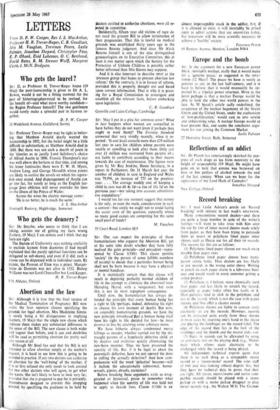Sir: One can respect the principles of those humanitarians who
support the Abortion Bill, yet at the same time doubt whether they have fully realised the grim principle—and precedent—repre- sented by Clause 1(l)(b). This clause permits 'society' (in the person of some fallible members of society) to decide that a particular human being shall not be born because it may have a physical or mental handicap.
It is statistically certain that this clause will result in depriving perfectly normal children of life in the attempt to eliminate the abnormal (out- Heroding Herod, with a vengeance); but even this is not its most repugnant consequence.
Until now, the humanitarian has always de- fended the principle that every human being has a right to life (perhaps, indeed, defending his right to choose his own moment of death). But now, on ostensibly humanitarian grounds, we have the new principle introduced Ihat a human being shall have his right to life decided for him—he must deserve to live by attaining some arbitrary norm.
We have hitherto always condemned mercy killings as murder, whether carried out by the dis- traught parents of a hopelessly defective child, or by doctors and midwives quietly eliminating the new-born monster. Thus we have preserved the sanctity of life. But, if it be legal to abort the potentially defective, have we not opened the door to culling the actually defective? And how com- prehensive will the word 'defective' become—will it include the educationally subnormal, homo- sexuals, gipsies, dwarfs, stutterers?
Before brushing these arguments aside as exag- gerated or hysterical, pause to remember what happened when the sanctity of life was held not to apply to Jewish lives. Clause 1(1Xb) is an
almost imperceptible crack in the edifice, but, if it is allowed to exist, it will inevitably be prised open to admit actions that are enormities today, but tomorrow will be mere scientific measures to achieve a 'healthy' society.


































 Previous page
Previous page